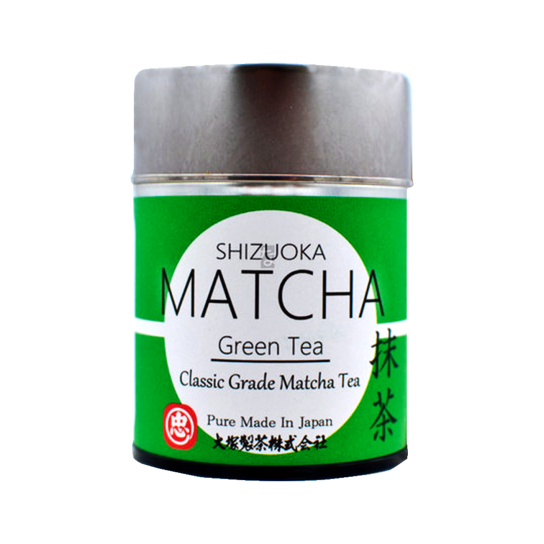Matcha Seicha aus Shizuoka
Otsuka
Matcha Seicha aus Shizuoka
Made from high quality Tencha tea with a bright green hue, this matcha is rich in aroma and sweetness. Matcha can also be used to make matcha lattes, as a baking ingredient, or simply sprinkled over vanilla ice cream.
The traditional way to prepare matcha comes from the Japanese Tea Ceremony. It involves using a matcha bowl, a bamboo whisk- chasen and a bamboo spoon- chashaku. Place 2 chashaku spoons of matcha (1,5g) in a matcha bowl and pour 100ml of hot water (80 °C). Chasen in hand, vigorously whisk your matcha from the wrist in m-shaped, not circular, motion. In about 20 seconds your bowl should be filled with a perfect jade-green foam. You can add more water now if you like your matcha to be less strong.
Matcha tea is less suitable for pregnant women, nursing mothers, small children and children (due to the caffeine contains). Consume only in responsible quantities.
30 gr |
Nyní skladem
Popis
Složení a alergeny
Nutriční hodnoty
Matcha tea contains a lot of caffeine, also called theine. Caffeine is an alkaloid that occurs in various plants such as coffee, cocoa beans or tea leaves. When we drink caffeinated drinks, the caffeine enters the bloodstream a short time later and is excreted a few hours later. The caffeine in tea makes you feel better and lasts longer than in coffee. The reason for this is quite simple: caffeine in roasted coffee is released immediately upon contact with stomach acid and works very quickly. When it comes to caffeine in tea, however, things are a little different because the caffeine contained in tea is bound to polyphenols. The effect of this is that the caffeine is only released in the intestines and the effect is felt later but much longer. 25 mg of caffeine in a cup of matcha tea is the reason why many tea drinkers swear by matcha as a stimulant.
Product Name: Matcha Seicha aus Shizuoka
Net capacity: 30g
Storage: Store in a cool, dry place.
Contact: 〒436-0009 1638 Ono, Kakegawa City, Präfektur/ Shizuoka/ Japan
* Wir bitten um Verständnis, dass das Produktdesign von der Abbildung abweichen kann.
Green Tea (Matcha)
100 g contain on average:
Calorific value (energy): 1356kj / 324kcal.
Fat: 5,3g
- of which shortest fatty acids: 0,7g
Carbohydrates: 39,5g
- of which sugar: 1g
Protein: 29,6g
Salt: 0g
Popis
Matcha tea contains a lot of caffeine, also called theine. Caffeine is an alkaloid that occurs in various plants such as coffee, cocoa beans or tea leaves. When we drink caffeinated drinks, the caffeine enters the bloodstream a short time later and is excreted a few hours later. The caffeine in tea makes you feel better and lasts longer than in coffee. The reason for this is quite simple: caffeine in roasted coffee is released immediately upon contact with stomach acid and works very quickly. When it comes to caffeine in tea, however, things are a little different because the caffeine contained in tea is bound to polyphenols. The effect of this is that the caffeine is only released in the intestines and the effect is felt later but much longer. 25 mg of caffeine in a cup of matcha tea is the reason why many tea drinkers swear by matcha as a stimulant.
Product Name: Matcha Seicha aus Shizuoka
Net capacity: 30g
Storage: Store in a cool, dry place.
Contact: 〒436-0009 1638 Ono, Kakegawa City, Präfektur/ Shizuoka/ Japan
* Wir bitten um Verständnis, dass das Produktdesign von der Abbildung abweichen kann.
Složení a alergeny
Green Tea (Matcha)
Nutriční hodnoty
100 g contain on average:
Calorific value (energy): 1356kj / 324kcal.
Fat: 5,3g
- of which shortest fatty acids: 0,7g
Carbohydrates: 39,5g
- of which sugar: 1g
Protein: 29,6g
Salt: 0g
